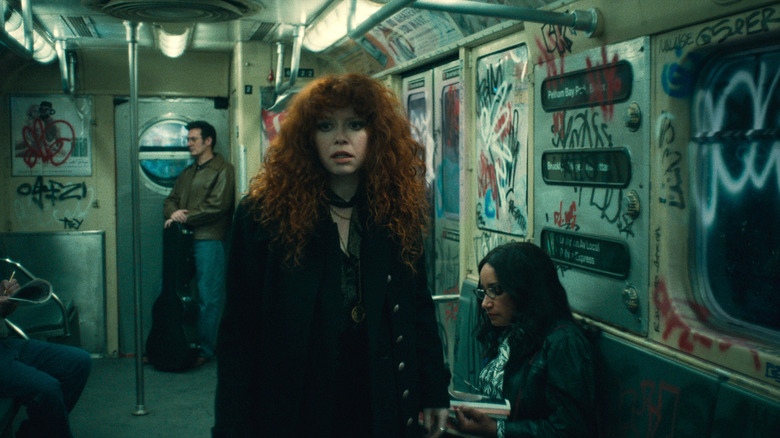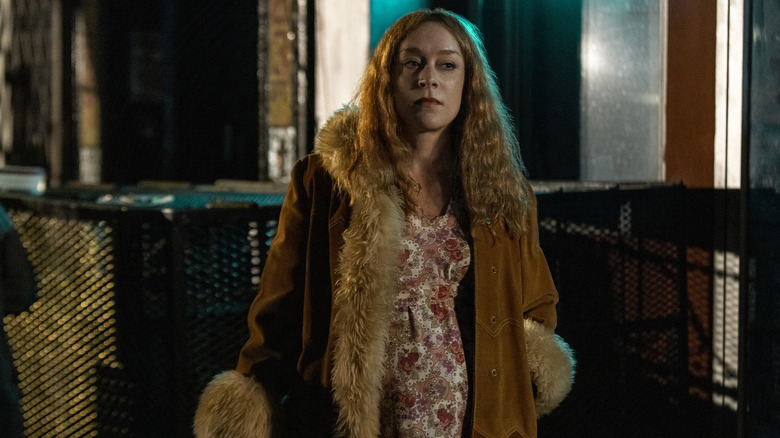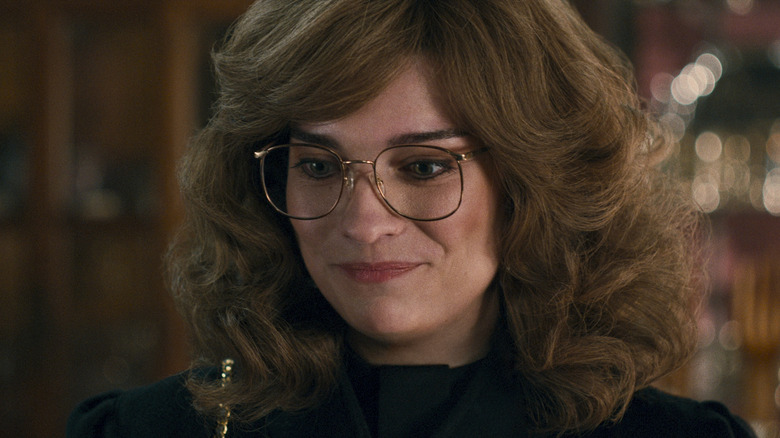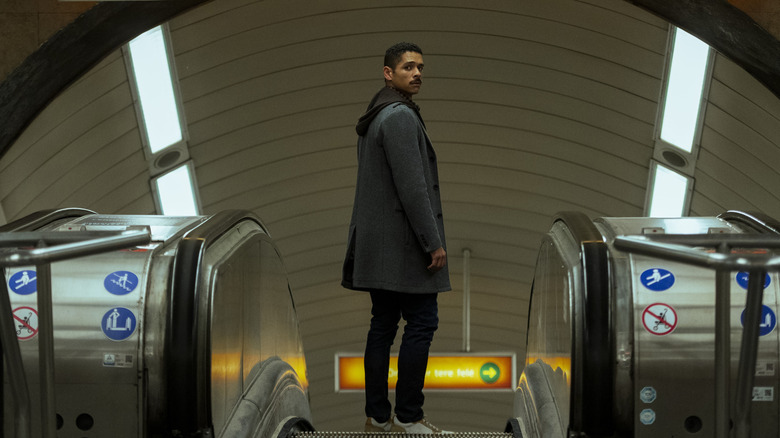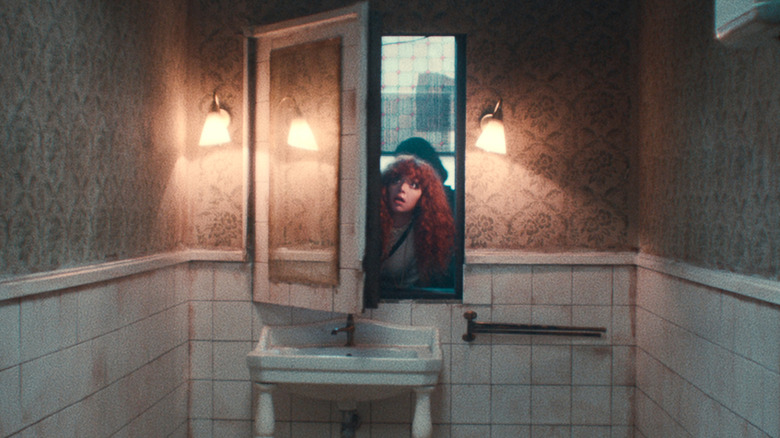Russian Doll Season 2 Ending Explained: The Stages Of Grief Are Finally Complete
Content Warning: "Russian Doll" deals with heavy themes, including drug use and addiction, mental illness, child abuse and neglect, suicide, and death, and this piece discusses them in detail. Reader discretion is advised.
Season 1 of the Netflix original series "Russian Doll" stuck its two protagonists, Nadia (Natasha Lyonne) and Alan (Charlie Barnett), into a time loop that forced them to reconcile some of their more selfish tendencies in order to be better people and heal from past trauma. Nadia suffered extensively as the result of growing up with a mentally ill, drug-addicted mother Lenora (Chloë Sevigny), and never dealt with her feelings, while Alan has shut himself off emotionally from the world and has to learn how to be more empathetic. Season 1 is like cognitive-behavior therapy, forcing Alan and Nadia to redo experiences until they get they change their patterns of behavior.
In order to dig deeper in season 2, "Russian Doll" introduced a new time-bending conceit: Manhattan's 6 train now takes Nadia and Alan not only back in time, but back into the bodies of their ancestors. They are able to quite literally walk in the shoes of the people who came before them, and Nadia sees it as a mystery to be solved, a way to fix the present by altering the past. It turns out that "Russian Doll" is not only a meditation on trauma, but on grief, and season two takes Nadia through the stages of grief: denial, pain, anger, guilt, bargaining, depression, and eventually acceptance. Alan learns a similar lesson about acceptance, but it's not as deeply explored and could lead to more for him in a potential season 3.
Let's dig into the ending of season 2 of "Russian Doll," a heart-wrenchingly bittersweet conclusion to a mind-bending and thought-provoking season.
Spoilers for the season 2 finale of "Russian Doll" from here on out!
"That's how the story goes."
After discovering that she's able to back into her mother's body (while pregnant with herself, what a concept!), Nadia decides that she wants to try to fix her mother's mistakes and hopefully create a better life for herself in the future. She learns of her mother's affair with Chez (Sharlto Copely), who stole the family's fortune out from under her, and figures she can fix things by getting the South African gold coins called Krugerrands back from him. She ends up getting them back only to lose them all over again on the 6 train, mirroring when her family's belongings were originally stolen and put on a train as they fled Hungary during the Holocaust. Nadia goes back further still, stealing her family's belongings back from the Nazis and burying them with a treasure map to dig back up years later, but she finds out that she has only set the original train events as she knows them into motion: the buried treasure was a "miracle" her grandmother had spoken of since her youth, and she ends up exchanging it for the very Krugerrands that Lenora loses later on. It's a pretty brutal reveal towards the end of the season, and it sends Nadia spiraling because she feels so out of control.
Nadia ends up giving birth to herself in the past, kidnaps the infant, and brings it back to what she thinks is the present, breaking time in the process. Alan chastises her for collapsing the timelines in upon themselves as they return to the nightmarish party they repeatedly lived through in season 1, but Nadia thinks that if she can protect the infant version of herself, everything can be fixed. Not only will she find a way to fix the past, but she will find a way to stop Ruth (Elizabeth Ashley) from dying from an illness that's progressed throughout the season while Nadia's been off traipsing through time. "There's time. There's time for everything," she tells Alan, who points out that there isn't time if it's breaking. He finally convinces her to get back on the train and take baby Nadia back to Lenora (and back to a childhood that adult Nadia knows will be painful), but when they board the train they meet Nadia's friends on their way to Ruth's wake. The timeline shenanigans had a horrifying consequence: Nadia missed Ruth's passing, and never got a chance to say goodbye to the woman who was more of a mother to her than Lenora ever was. It crushes her and she and Alan leave the train.
As they walk in the dark, they discuss their shared pain at not being able to change the past. Nadia calls it a "closed-loop" and chalks it up to an absence of free will, but Alan hits the nail on the head: "We can't escape being the product of things we can't change."
Nadia can't change the fact that she had a traumatic childhood. She can't change the fact that her mother was deeply mentally ill and became self-destructive instead of getting help. She can't change the fact that her grandmother's trauma as someone who escaped the Nazis made her stern and distant with her own daughter, inflicting her own trauma in turn. As Nadia has tried to "fix" each of the timelines by trying to change the actions of her ancestors, she's gained newfound empathy for them. She might not be able to completely agree with their decisions, but she's finally able to forgive them. Then, once she forgives them, she is able to forgive herself for her own transgressions, including being so caught up in the past that she missed saying goodbye to the most important person in her world.
Just as Nadia and Alan start recognizing the lesson in their experiences, they're hit by visions of oncoming trains and thrown into a surreal void space with massive columns and waist-deep water. Their watches have broken and they're outside of time. Nadia catches the infant version of herself and finds the back of Krugerrands, but realizes she cannot carry both. She lets the gold sink, accepting that she has to let go of the past in order to embrace her own future. While Alan has a confrontation with one of his ancestors (more on that later), Nadia ends up back on the train, across from her mother. Nadia asks if she's dead and her mother deflects before telling her "just because I came before you doesn't mean I have all the answers. You're looking in the wrong place."
She asks Nadia if she would choose her as a mother if she could do it all over again, and Nadia is confronted with everything that shaped her. She looks back at her grandmother, both young and older, with life experiences Nadia now fully appreciates. She looks forward at herself as a bookish child, and to Ruth as an old woman and as her younger self, the surrogate mother that was always there for Nadia when Lenora wasn't. Throughout the season, Nadia has gone through the stages of grief for Ruth, and in part, for herself, because Ruth was the one part of herself left alive. Without Ruth, every tie to her childhood and her family is gone, leaving her adrift. It's a terrifying thing, and it's not shocking that Nadia tries so desperately to stop it. She's angry with her mother and grandmother for not being the caregivers she needed, she feels guilty for not being able to "fix" things, and she goes into a deep depression where she avoids her pain entirely by literally kidnapping herself. She spends most of the season in denial that Ruth won't bounce back, and bargains for a better future through all of her various time-traveling schemes. Finally, across from her mother on the train, she comes to the final stage: acceptance.
"Yeah, I didn't choose you the first time, but I guess that's just how the story goes, huh Mom?"
She hands the infant Nadia over to Lenora, recognizing that she can't change the past or the way it's impacted her, but she can change the way she deals with it moving forward. Her acceptance is powerful, and it gives each of the "ghosts" on the train the closure to leave. She's forgiven them and relieved them of the burden of the generational trauma they imprinted on her, though there is one last thing she has to do before she can move on.
'Shine On You Crazy Diamond'
Ruth, played by Annie Murphy ("Schitt's Creek") in flashback scenes, gave everything to her best friend Lenora and her daughter, Nadia. She cared for them both deeply, giving her wedding ring to a pawnshop to get the Krugerrands back after Chez pawned them, joking that it was okay because her husband had just died, anyway, and helping to raise Nadia when Lenora was in and out of mental health facilities in her youth. Eventually, Nadia went to live with Ruth, and Lenora died soon after, possibly from suicide. A big part of season 1 focused on Nadia forgiving herself for her mother's death and what she felt was her abandonment of her mother, while season 2 lets her forgive her mother for everything that went wrong.
With that done, she has to find peace with the fact that she didn't get to tell Ruth everything she wanted to tell her. That's her "Coney Island" now, the thing that would make everything right if only it had happened. She learned of the concept from the elderly version of Chez when she told him that the Krugerrands would have changed the course of her life. In the end, it doesn't matter if the thing in the past would have changed anything at all because you can't change the past. Not even if you have a magic time-traveling subway train. After Nadia gives her infant self back to her mother, the train car fills up with passengers, and the versions of Ruth, Lenora, and her grandmother all push through the train in the moments after Nadia was born on the subway platform. The universe kindly provides Nadia with the chance to say something, and she does, grabbing Ruth's hand and saying, "You had no obligation but you loved me anyway, right? Bye, Ruthie."
Young Ruth doesn't recognize the stranger on the train, but it gives Nadia the closure she needs anyway. Her watch is fixed, and Pink Floyd's "Shine On You Crazy Diamond" begins to play. The song plays until the episode ends, as Nadia leaves the train, goes to Maxine's apartment for Ruth's wake and eventually ends up in the bathroom from her season 1 time loop. She looks in the mirror, and for the very first time, she smiles at herself. She's forgiven every part of herself, including the parts she inherited from others, and she's accepted that she can't change her experiences, but she can change how she deals with them.
The inclusion of "Shine On You Crazy Diamond" is a nice touch, as it was written by Pink Floyd as a tribute to former band member Syd Barrett, who split from the band after their second album due to drug use and serious mental health concerns. The deeply flawed characters of Nadia's world are similarly tortured by their inner demons, and the lyrics work well as a dirge for Ruth, who was partially responsible for her own death by smoking cigarettes long after the doctors told her to quit, and for Nadia's former self, who would drink, do whatever drugs were passed her way, and who ran from her pain instead of confronting it. It also works well for Lenora, who herself had a troubled childhood and was frequently her own worst enemy. Even as the song comments on the subject's flaws, it celebrates them and explains the trauma that forged such chaos:
"Remember when you were young, you shone like the sun
Shine on you crazy diamond
Now there's a look in your eyes, like black holes in the sky"
The song ends on an upbeat note despite its tragic subject, and it mirrors Nadia's journey, telling her that despite each of the things about herself that she cannot change, she can certainly still shine.
Alan's journey
Season 2 saw Alan discover that he could travel to his grandmother's body in East Berlin during the Soviet occupation, where he fell in love with one of his grandmother's admirers. Alan, like Nadia, tried to change the past, telling his new love that if he only waits for a few decades, the Berlin wall will crumble and he will be reunited with his family then. It doesn't work, leaving Alan heartbroken. He finds his grandmother in an "employees only pump room" somewhere in the subway system and also somewhere out of time, and he asks her if he's dead. Like Lenora, she dodges the question, and they talk about their shared lost love instead. Alan wants answers, but she doesn't have any, reinforcing the theme that just because someone came before, doesn't mean they know everything. She explains to him:
"I don't know, and that's okay. He was never going to stay, I was never going to go. I could not leave the life he was building. I helped him get out. There was no other way it was supposed to happen."
Alan is frustrated because he was always told that he was just like his grandmother, but he doesn't understand how she could have let her love slip away. There's more to explore here, especially with Alan's attachment to this particular relationship and how it might be representative of repressed gay feelings or even questions about his gender, but the series doesn't dig any deeper. Instead, Alan asks for more answers, telling her that he "just wants to know." His grandmother can't give him any of the answers he seeks, but she does have some pretty important advice:
"We can't spend our lives so scared of making the wrong move that we never live at all. Don't be so afraid to live."
This is where Alan finally finds his acceptance, and he follows his grandmother's instructions, looking for blue exit lights and eventually making his way back to the surface and the "real" world. He makes it to Ruth's wake, where he sees Nadia after her moment of acceptance, and they share a smile and a small, one-armed hug. Hopefully season 3 gives Alan more exploration because his arc this season didn't feel nearly as well covered as Nadia's.
That's trauma, baby
Here's the thing about trauma therapy: once you unlock one piece of the puzzle, you discover that five more pieces are missing. By letting Nadia explore her personal history in season 1 and her familial history in season 2, the series basically allowed her therapy to go even deeper. The early stages of grief for herself, her mother, and Ruth that she felt in season 1 have become too loud to ignore by season 2, and the only way out is through. No amount of running backwards in time can fix the future, but it can give her the clues with which to fix her present. It's heady stuff, and Alan's story feels like a compliment to Nadia's overall arc, highlighting the lessons they've both learned through a slightly different lens.
"Russian Doll" is complicated. It's messy. It's funny and painful and deeply weird, just like the process of healing. Here's hoping Nadia doesn't regress any if we get a season 3.
"Russian Doll" season 2 is currently streaming on Netflix.
